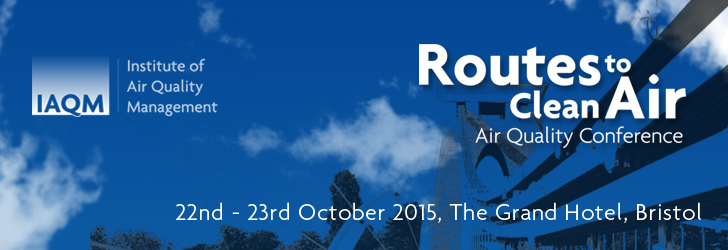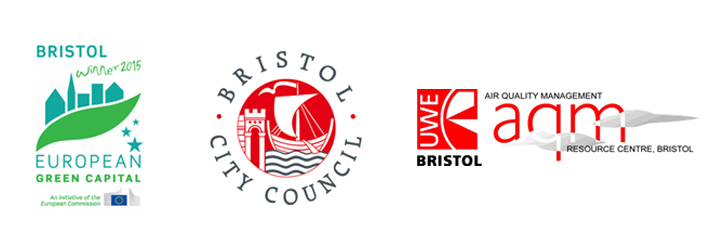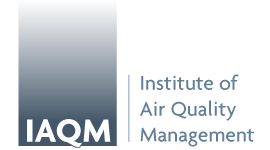We are pleased to present Routes to Clean Air, a two-day conference where academics, professionals and policy-makers will be able to share their experiences of improving traffic emissions. This event is part of the Bristol European Green Capital 2015 programme of events.
A number of international speakers will be talking at Routes to Clean Air, highlighting the importance of public communication and behavioural change surrounding road transport and air quality issues.
Confirmed speakers and topics
-
Cristina Guerreiro - Norwegian Institute for Air Research & The European Topic Centre on Air Pollution and Climate Change Mitigation – EU air quality limit value exceedances
Despite considerable improvements in the past decades, Europe is still far from achieving levels of air quality that do not pose unacceptable risks to humans and the environment. Air pollution is the top environmental risk factor of premature death in Europe; it increases the incidence of a wide range of diseases and has several environmental impacts, damaging vegetation and ecosystems. The latest analysis of exceedances of the EU air quality limit and target values in Europe will be presented. The data is based on the analysis of air quality status and trends published in the EEA (2014) Air Quality in Europe - 2014 report (http://www.eea.europa.eu/publications/air-quality-in-europe-2014).
-
Dr Ian Mudway - King's College London – Health effects
With recent discovery of emission defeat devices in diesel cars there’s an urgent need to refocus the debate around why this really matters. This is not simply an issue of customers being mis-sold a product, but a much more profound failure to prioritize public health over profit. In this lecture Mudway will review the evidence for the health effects of air pollution, with a particular emphasis on diesel exhaust emissions; including the emerging evidence of impacts on brain development during childhood and functional declines with age.
-
Dr Eckard Helmers – University of Applied Sciences, Germany Trier – Europe’s diesel car boom - Causes and Impacts
The European car industry has managed to decouple itself from the world market for the last 20 years by focusing on the diesel powertrain. This massive technology change resulted in some 45 million extra diesel cars in Europe until 2013. Four factors have been identified in order to explain the very different dieselization rates across Europe. Minor greenhouse gas savings by the Diesel car boom were overcompensated by an increase of supply chain CO2 emissions and extensive black carbon emissions of diesel cars without particulate filters. Also, many Europeans have been exposed to excess NOx and fine dust this way.
-
Poppy Lyle - Greater London Authority - Reducing Emissions and Exposure in London
London policies, plans and projects, including the Ultra Low Emission Zone, the new London Local Air Quality Management framework, the Mayor’s Air Quality Fund and the Breathe Better together awareness campaign.
-
Dr Kirsty Smallbone - University of Brighton – Individual perceptions of air quality
-
Prof. Graham Parkhurst – University of the West of England - Air Quality Implications of New Technologies for Urban Mobility
Four processes lie at the contemporary intersection between urban mobility management and new technologies: automation, electrification, collectivisation (asset-sharing), and information (data-sharing). Each of these has implications for air quality. The presentation will consider whether those implications are likely to be positive or negative. It will be argued that much depends upon how the technological innovations are applied and, critically, what prospect there is for these four processes to be integrated in coherent local transport policy.
-
Claire Holman –Brook Cottage Consultants – LEZs: Are they effective?
Do LEZs improve urban air quality? The evidence from five EU countries concludes that there have been mixed results. LEZs in Germany, which restrict passenger cars as well as heavy-duty vehicles (HDVs), appear to have successfully reduced long-term average PM10 and NO2 concentrations by a few percent. Elsewhere, where only HDVs have been restricted, the picture is much less clear due to confounding effects
-
Petter Haugneland – Norwegian Electric Vehicle Association - Electric Vehicles: Norwegian experience
An overview of the Norwegian EV policy and market - There are now over 60.000 battery electric cars (BEVs) in Norway. So far this year, the BEVs have an 18% market share. The Norwegian EV success story is a reality because of a long term policy which has an incentive package for zero emission cars. High taxes on higher emission cars and zero tax on zero emission cars, have been able to see the BEVs become a true competitor in the Norwegian car market. High customer satisfaction levels have of course also played its part in the rise of electric vehicles with each one sold having an average of three additional cars being bought based on the owner’s recommendation.
-
Dr Mark Burgess - Oxford Brookes University – Drivers’ perceptions and experience of Electric Vehicles in the UK
This talk will present an overview of our research on the UK-wide Ultra-Low Carbon Vehicle Demonstrator Trial that was supported by InnovateUK (formerly the Technology Strategy Board). The trial involved the most comprehensive psychological study of EV drivers in the largest multi-vehicle, multi-location trial in the world and knowledge transfer to the UK government, policy makers, car manufacturers, energy providers, and transport groups. Some of this talk will highlight the relative merits of “being green” and “being clean”.
-
James Tate - University of Leeds - On road emissions: Results from latest remote sensing campaign
-
Prof. Jim Longhurst - University of the West of England - Air quality in historical perspective — or why we fail to learn the lessons of history
This presentation will explore contemporary issues of air pollution through the lens provided by history. It will present a perspective drawn from an analysis of historical, and mostly failed, attempts to manage air pollution from classical times until today. It will ask the question why have we not learnt from the lesson history provides? It will do so with the benefit of 2020 hindsight!
-
Colin Rees - Strategic City Transport at Bristol City Council - Bristol’s Sustainable Transport Policies
Bristol is making significant progress towards sustainable growth with high profile investments in transport. These include improved walking routes, a network of new cycle routes, improvements to the West of England suburban rail network with improved frequencies, the opening up of freight lines to passenger and new stations, developing a Bus Rapid Transit network to serve the sub-region and improvements to local bus services which have has attracted new passengers with a package of bus priority measures and more competitive fares.
-
Xavier Querol - Institute of Environmental Assessment and Water Research (ID/EA) - Airuse Mitigation in Southern Europe
Major results obtained from the AIRUSE LIFE+ (LIFE11 ENV/ES/584, www.airuse.eu) on urban air quality will be presented. This deals with improving air quality in urban areas from Southern Europe by obtaining detailed PM source apportionment data and, accordingly, suggesting air quality measures based. Once the main source contributions to ambient levels of PM10 and PM2.5 are obtained, the strategic goal of the AIRUSE project is to develop, test and propose specific and non-specific measures to abate urban ambient air PMx, targeted to meet air quality standards and to approach as much as possible the WHO guidelines. A review of results covering the evaluation of (i) the effectiveness of major road traffic measures in Europe, (ii) the effectiveness of road dust suppressants, (iii) the features of biomass burning emissions and the needs for actions to abate them, and (iv) the natural contributions to PM and possible ways to decrease exposure, will be show.
The Low Emission Strategy for Scotland draws together policies across central and local government with particular respect to transport, placemaking, health and communications. Objectives and actions will support a challenging vision. A National Modelling and Monitoring Framework will provide the evidence to enable a National Low Emission Framework to be delivered, with the latter exploring the consistent approach to Low Emission Zone development.
-
Dr James Cooper - Defra and the UK's New Air Quality Plans
James' talk will set out the government’s vision for improving air quality, how this is reflected in our plans and what we are particularly looking for from the consultation.
- Simon Cook - Assistant Mayor - Political Leadership for Clean Air
Simon Cook, is Assistant Mayor for Place at Bristol City Council. He will reflect on the challenges of delivering clean air for cities based on his experience of leading the City Council and sustainable transport agenda in Bristol, the European Green Capital 2015. He will set out his thoughts on the role of political leaders, science, public opinion and regulation in creating healthy cities. His presentation will complement that of Colin Rees, on the practical action being taken to create a sustainable, clean transport system for Bristol.
- Julie Girling - Member of the European Parliament for the South West of England

National Air Quality Awards
This awards ceremony shall take place as part of the networking dinner which will be on the first evening of this two-day conference and is included in the cost of your ticket. It will provide a great addition to the now jam-packed programme of events we have planned for attendees.
The inaugural National Air Quality Awards seek to give value and recognition to those who make these special efforts to boost air quality, whether in the public, private or charity sector.
A panel of industry experts will judge entries in six categories covering a range of sectors from local authorities through to industry, individuals and technology.
The categories are:
- Local Authority Air Quality Initiative of the Year
- Best Air Quality Communications Campaign 2015
- The Innovation in Air Quality Technology Award
- Car Manufacturer Air Quality Progress Award 2015
- Passenger Transport Air Quality Award
- Air Quality Champion Award
For more information on how to enter please visit the AQN website
Location
Bristol City Centre, The Grand, Broad Street BS1 2EL.
Attendance Costs
- IAQM/IES members - £195
- Non-members - £285
To attend please send your booking form (doc) to Emma Fell.
Spread the word!
If you provide products or services to the Air Quality industry why not consider some of the branding and exhibiting opportunities that are available at Routes to Clean Air? For more information please contact Emma Fell.
This event is brought to you by The Institute of Air Quality Management (IAQM) in association with the University of the West of England (UWE) and Bristol City Council (BCC).
Do you have an air quality success story?
The Bristol European Green Capital ‘Routes to Clean Air’ conference invites poster presentations of some great examples best practice in air quality. Perhaps your city implemented a novel approach to reducing air pollution, or you may have been involved in evaluating the air quality impact of a transport measure? If so, we would love to hear from you.
Please email aqmrc@uwe.ac.uk for more information






